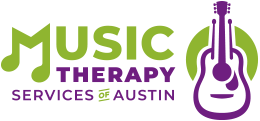Our Services
Assessments are a vital component of the therapeutic process. They are used to diagnose strengths and needs of the client. Assessments typically involve an initial music therapy session, interviews with the client, family, and members of the interdisciplinary treatment team, and reading client history.
Target the client’s cognitive, emotional, sensorimotor, communication, and/or psychosocial therapeutic needs based on the initial assessment. The therapist determines appropriate goals and objectives after the initial evaluation and keeps weekly session notes on their progress.
During the music therapy sessions, the therapist incorporates music that is motivating for the client. We usually bring along a variety of instruments and activities (frame drums, Q-chord, tambourines, iPad, etc.) and provide a safe outlet for musical and emotional expression.
Provided primarily to agencies and facilities that cater to multiple clients with similar needs and goals. Group sessions typically last 30- to 90-minutes. Music Therapy group sessions typically address social and communication goals, to provide a sense of belonging and comradery.
Provided for parents, groups, and facilities. Involves initial assessment, development of individualized music-based tools and techniques, training parents and/or staff to use the techniques, and follow-up evaluation to determine its effectiveness.
Involves facilitating sessions with related practitioners (physical therapists, speech therapists, occupational therapists, art therapists, social workers, counselors), which can enhance the effectiveness of the therapeutic process.
Our music therapists are able to now conduct music therapy services from the comfort of your own home through a teletherapy platform. If you are out of the local area, or just prefer a virtual option, we are able to accommodate and adapt our services to meet your needs. The same goals/objectives addressed in the Individual Therapy Session tab are also addressed virtually.
Music therapists are trained in adapting teaching techniques to help clients be more successful learning an instrument. Adapted lessons have the end goal of learning the techniques of playing an instrument and improving musicality. We offer lessons in piano, guitar, voice, percussion, and clarinet.
Goal Areas Addressed:
Cognitive – Pre-Academic & Academic skills (counting, reading, writing), Literacy Skills, Following Directions, Safety Skills, Money Management
Social/Emotional – Eye contact, Initiation/Continuation of Conversations, Taking Turns, Shared Play, Management of Behaviors, Coping Strategies, Self-Esteem
Language/Communication – Phonation, Initiation/Continuation of Conversations, Independency, Self-Esteem, Breath Support, Volume Control, Rate of Speech Control, Receptive & Expressive Communication
Psychological – Management of Behaviors, Coping Strategies, Trigger Identification, Organization, Self-Esteem, Understanding Emotions, Management of Anxiety
Physical/Motor – Gait Training, Stability, Range of Motion, Crossing Midline, Fine Motor Skills, Gross Motor Skills, Movement Imitation, Quality of Life, Dexterity


